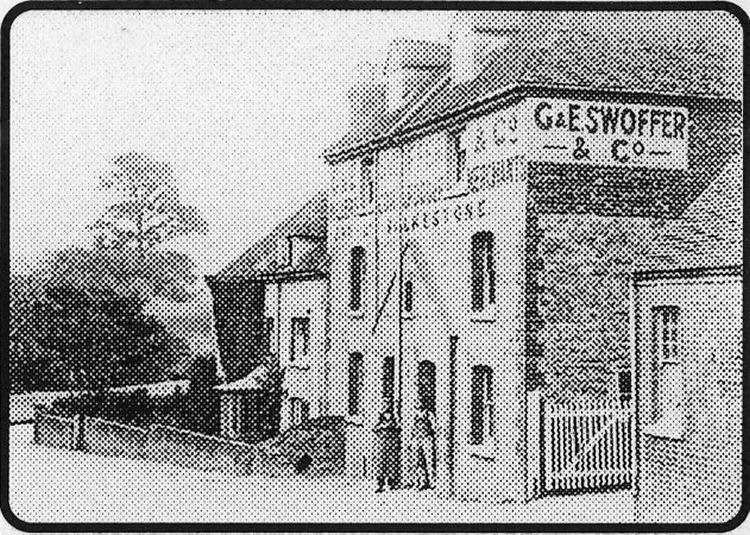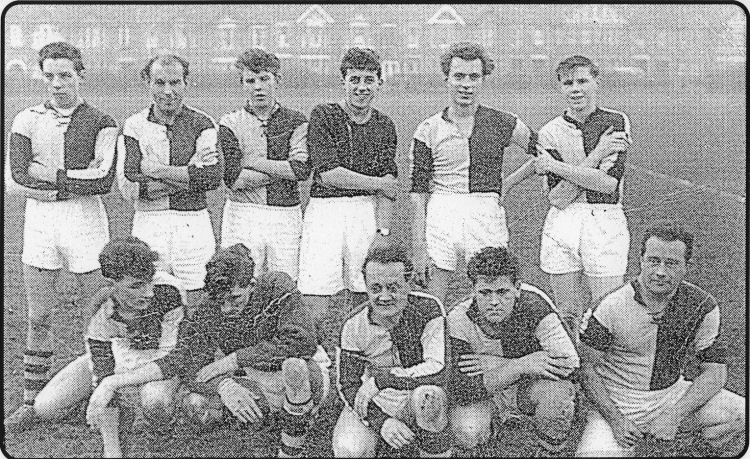Page Updated:- Sunday, 07 March, 2021. |
||||||||||
 From the Folkestone Herald Published 30 March 2000 Alec’s dream. AN OLD Folkestonian now living in Hull, Mr Alec McGarry, 84, loves his old home town and he has a dream. That dream is that one day someone will take over where that great fighter pilot Sir Douglas Bader left off and try and get official recognition for the men who were engaged in building up the coast’s defences when Britain faced a real threat of invasion, in the early part of the Second World War. “Sir Douglas Bader was so impressed with all the defence work that the construction workers did, that he wanted to know, after the war, why these men had not been awarded the Defence Medal. “He came down to the fighter aerodromes at the time of the Battle of Britain and saw how the men worked all hours to fill in the bomb craters and keep the airfields operational. “After the war this brave man began asking why these men had not been awarded medals and started to campaign on their behalf. “But, sadly, the great man died and there was no one to carry on the fight for the award. “I do hope there is someone in this part of the world, perhaps Mr Michael Howard MP, who might be able to start the ball rolling again. “It will help honour this great man’s work. How he would have liked to see justice given to these men,' says Alec. “I think I could write a book about all those times. The memories will stay with me all the rest of my days - How could we ever forget! I am now 84. And he recalls how building workers like him were issued with a printed card to show they were essential workers. His was headed: ‘Borough of Folkestone: This is to certify that A.C.R. McGarry, of 19 Taylor Street, Folkestone is an essential worker, and must remain after general evacuation. - Signed Alfred Beesley, Chief Constable.' On the reverse it stated ‘This order is served under powers given to me by the Regional Commissioner under Defence Regulations etc etc and will be strictly enforced, under penalty. Alfred S Beesley, Chief Constable, July 1940.’ “It meant,” said Alec, “that there was no way we could leave Folkestone without authority."
Respect. As I wrote last week, Alec worked for Otto Marx who, he said, built all the defence works from East Cliff to Dungeness Point — East Cliff, the harbour, Sandgate, Hythe, and Dymchurch and so on. “There was only one man that could have got this vital job done, and that was Otto," he said. “He had a big Daimler saloon car and would visit all the sites being worked on. He would start and finish the same time as us. He commanded a great deal of respect from us all. He knew how to get the best out of everyone that worked for him.” A man who likes to sing while he is working, Alec had the nickname of “The yodelling brickie” on the building sites. And, he said, “When Otto Marx heard me he always wanted to know how I learnt to do this!” Alec's mother, Maud Agnes McGarry (nee Crawford) married twice and he has four step-brothers, Joe, Hugh, Mick and Bernard. Sister Eileen and step-sister Angie have both passed on, as have his mother and step-father. Alec did a four year apprenticeship as a bricklayer with Albert J. Cook, of Tram Road, before working for Otto Marx. He left Folkestone in September 1942, recruited by building contractor George Stone, along with mate Johnny Andow, to work on building repairs in London and Coventry after the devastating wartime attacks on those cities. Alec says it sticks in his memory how much the town used to depend for trade on the local military garrison. “There was Shorncliffe Barracks, Risborough Barracks, Napier Barracks, Somerset Barracks, Ross Barracks, Moore Barracks and the bases of the RASC, Royal Engineers, Royal Army Medical Corps and the Royal Military Police. “I also remember some of the regiments that were stationed here. The King's Own (1924-28), Sherwood Foresters, The Buffs, East Kents, Manchester Regt, The Inniskillings, 13/18th Hussars, 11th Hussars, The Greys, Seaforth Highlanders, East Surreys and the Royal Artillery. “You had men from all over the British Isles, but there was seldom any trouble. They were fit and were a pleasure to have around. I remember they liked to frequent the Victoria and White Lion public houses. “Local people relied so much on the barracks for shop and other trade and civilian jobs. And then there was all the activity, with sporting and other events, such as the hospital gala and Sunday church parades at Napier Barracks, I particularly remember,” says Alec. “We didn’t need money then to watch sport,” he said ruefully. He remembered the Garrison Churchyard at Pond Hill and how schoolchildren
took flowers to put on the graves of brave soldiers who gave their lives in
two world wars. Donkeys. And he couldn’t forget how they used to help the blind and wounded men who were cared for in a home at the bottom of Military Hill and Sandgate Hill. “We used to go and help take these brave men up on to the Leas, as Sandgate Hill was too steep for them with their invalid chairs. “We used to hitch up donkeys to these and pull them up to the top of Sandgate Hill and then take the donkeys down again and bring some more up. How we enjoyed this!” Alec apologises for his writing because he says he has a lot of trouble with his eyesight these days. But there’s not much wrong with his memory, it seems, because he has written pages and pages recalling days gone by in Shepway. “I could write a book!” he told me.

G. & E. Swoffer were wholesale fruit merchants and millers and had the old Horn Street mill and premises in Dover Road. Descendant Brian Swoffer, told me about the firm which will be featured in Memories.

MEMORIES reader Mr M. L. Blackman, of 16 Cobden Road, Hythe has sent me this soccer picture, believed to date from 1957 and to have been taken at the Stanley Road, Cheriton sports field. He says a friend believes the player kneeling, bottom left, is Barry Shaman and wonders if any one can help identify the others and provide any other details.
|
||||||||||
|
If anyone should have any a better picture than any on this page, or think I should add one they have, please email me at the following address:-
|
||||||||||
| LAST PAGE |
|
MENU PAGE |
|
NEXT PAGE | ||||||
